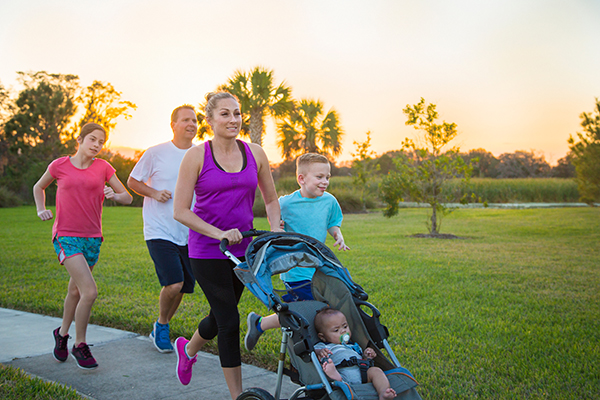
Although it is well-established that physical fitness is essential for optimal health and longevity, most studies have focused primarily on cardiovascular endurance and muscle strength. This new research, however, shifts the spotlight to flexibility – a frequently neglected aspect of fitness – and explores its potential impact on how long people live.
The researchers conducted a detailed flexibility assessment using a tool called the "Flexitest," which measures the range of motion in 20 different movements across seven key joints in the study: ankles, elbows, hips, knees, shoulders, trunk and wrists. From these measurements, they developed a combined score, the "Flexindex," to represent each person's overall body flexibility.
Published in the Scandinavian Journal of Medicine & Science in Sports, the study included nearly 3,139 middle-aged participants (2,087 men and 1,052 women), aged 45 to 65 years, from the CLINIMEX Exercise cohort in Rio de Janeiro, Brazil. The participants were monitored over an average of nearly 13 years to track their health and survival.
People with higher Flexindex scores had a significantly lower chance of dying during the follow-up period. This link remained strong even after considering factors like age, body mass index (BMI) and general health.
The impact of flexibility was especially noticeable at the extremes. For men, those in the lowest 10 percent of flexibility scores had a 21.2 percent death rate, while those in the top 10 percent had only a 7.8 percent death rate. Among women, the gap was even wider – a 15.4 percent death rate for the least flexible group compared to just two percent for the most flexible.
Additionally, the study reinforced previous observations that women generally have greater flexibility than men. On average, women scored 35 percent higher on the Flexindex than men. Interestingly, women aged 61 to 65 were around 10 percent more flexible than men aged 46 to 50, despite being 15 years older.
While the study doesn't conclusively prove that improving flexibility will extend life, it does indicate that flexibility could serve as an important indicator of overall health and lifespan. The researchers suggest that poor flexibility might be associated with other health conditions, such as chronic inflammation or stiff arteries, which could increase the risk of death.
This study opens new doors for understanding the broader impacts of physical fitness on health. It implies that flexibility assessments like the Flexitest could be valuable in identifying individuals who may be at greater risk of dying early. Moreover, it prompts further exploration into whether targeted flexibility exercises might help boost longevity.
Benefits of stretching regularly
Regular stretching can improve your mobility, keep your body flexible and maintain independence as you age. Making stretching a regular habit brings many benefits – both mental and physical. Whether you enjoy cardio workouts or focus on strength training, stretching should be a key part of your exercise routine.
Here are some key benefits of stretching regularly.
Improved flexibility
Increasing your flexibility through stretching makes everyday activities easier, such as bending down to pick something up, tying your shoelaces, or reaching for items on high shelves. It helps your body handle physical stress better and can improve your posture. Plus, having good flexibility reduces the risk of muscle cramps and can delay the loss of mobility that often comes with aging.
Improved posture
In today's digital world, many people spend hours sitting at desks in front of computers – often leading to poor posture like rounded backs or slumped shoulders. This not only affects your posture but also impacts blood flow and hormone levels over time–especially as you age. Stretching regularly can help correct these issues by easing tension in muscles that have adapted to these poor posture habits. It is important to note that fixing posture doesn’t happen overnight. Consistent stretching over time can gradually improve it and help align your body correctly.
Muscle imbalances, which are quite common, can also contribute to poor posture. A study published in the Journal of Physical Therapy Science found that combining stretching with strengthening exercises for specific muscle groups can reduce pain and promote better body alignment, which, in turn, helps improve posture.
Boosts physical performance
Warming up with dynamic stretches before a workout can prime your muscles for activity – making you better prepared for physical exertion. Research published in Sports Medicine shows that warming up with stretches can help improve your performance in sports and other physical activities
Builds muscle strength
Contrary to popular belief, stretching is not just a light or mild form of exercise, it can help build strength. When you stretch, you lengthen your muscles, which can make your strength training more effective by allowing a greater range of motion. Additionally, stretching helps your muscles recover after a workout by reducing waste buildup and supplying more nutrients, which promotes muscle growth and health.
Improves blood circulation
Stretching before a workout increases your heart rate and enhances blood flow, delivering more oxygen-rich blood to your muscles. This enhanced blood flow helps prevent injuries as you exercise. Stretching also improves circulation throughout your body – benefiting your heart and kidneys. While pre-workout stretching is important, stretching during a workout can also be helpful. Doing static stretches mid-exercise can relieve tightness in your muscles.
A study in the International Heart Journal suggests that regular stretching can boost circulation, speeding up recovery and reducing muscle soreness.
Prevents and reduces lower back pain
Lower back pain can be very limiting and painful, often caused by weak glute muscles or tight hip flexors, like the iliopsoas. These muscles play a role in relieving stress on your lower spine. Stretching them regularly can lower your risk of back pain. Tight muscles can restrict your range of motion, increasing the risk of muscle strains in your back. Stretching regularly can help heal existing back pain by loosening tight muscles and prevent future pain by keeping your muscles flexible and strong.
Relieves muscle tension from stress
When you’re stressed, your muscles tend to tighten, especially in areas like your neck, shoulders and upper back. Stretching these muscles can help release this tension, providing immediate relief from stress. By focusing on stretching the areas where you carry the most tension, you can help your body relax and reduce stress-related discomfort. (Related: Yoga and mindfulness-based therapy can help stressed-out employees improve their quality of life.)
Calms the mind
Stretching is not just about physical benefits; it also helps to calm your mind. When you stretch, you can focus on mindfulness and relaxation, which can help calm your mind and reduce mental stress.
Activities like yoga combine stretching with controlled breathing and meditation, allowing you to slow down, find a sense of peace, and relax in today’s busy world.
Watch this video about the benefits of stretching daily.
This video is from the Daily Videos channel on Brighteon.com.
More related stories:
The benefits of intensive meditation last for 7 years, study shows.
Tai chi found to significantly improve knee movement and flexibility in osteoarthritis patients.
Tai chi better than strength training and aerobics at preventing falls among seniors.
Sources include:
Please contact us for more information.






















